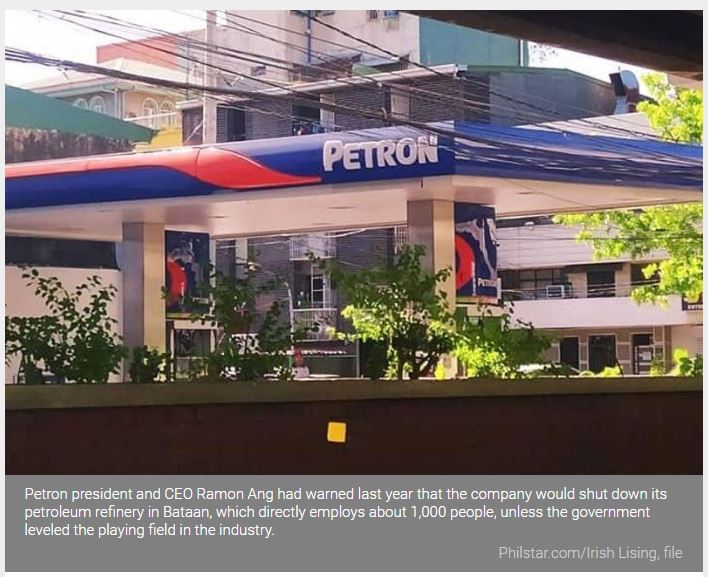Philippines: Petron may get tax exemption
MANILA, Philippines — Congress has given Petron Corp. a lifeline, exempting petroleum refineries from taxes and duties on crude oil imports.
Petron president and CEO Ramon Ang had warned last year that the company would shut down its petroleum refinery in Bataan, which directly employs about 1,000 people, unless the government leveled the playing field in the industry.
He argued that Petron, the country’s only remaining crude oil refiner, is taxed for both finished products and its crude oil imports upon landing, while importers of refined fuel pay tax only after sales.
The Department of Finance (DOF) has stood firm on the excise tax and value-added tax levied on Petron.
The DOF earlier said there was no need to amend the tax regime on oil products with regard to the taxes applied on the supply chain.
Moreover, Finance Secretary Carlos Dominguez said the closure of oil refineries was not a taxation issue, noting that this was happening all over the world as refinery margins are getting thinner.
“We note that in the refinery business, there may be market and timing issues – such as importing crude at a high price, then after refining, world crude prices might be lower, thus, refining margins could be lower. On the other hand, an importer who imports finished products can sell these products right away, making him less vulnerable to oil price movements. It’s actually a supply chain issue rather than a tax issue,” he said.
“We don’t need to change our tax laws on this. It’s happening worldwide, refinery margins are getting squeezed.”
Congress, however, reportedly introduced during the bicameral conference on the Corporate Recovery and Tax Incentives for Enterprises or CREATE bill the tax exemption that Ang wants.
Oil refiners are subject to 12 percent input value-added tax (VAT) on crude oil imports, which they refine and sell as pump products. Refined products are also subject to 12 percent output VAT and excise tax.
In contrast, importers only need to pay VAT once, as well as excise tax on their shipments of refined products.
Economic policy think tank Action for Economic Reforms (AER) has urged President Duterte to veto the provisions on the tax exemption for petroleum refineries, emphasizing that reducing the country’s corporate income tax rate and introducing changes to the incentives system are not intended to give advantage to certain parties.
“Exempting local refineries from duties and taxes is discriminatory and swings the advantage towards certain importers. Furthermore, oil refineries are not a part of the Strategic Investment Priority Plan which defines the activities qualified to receive incentives. We oppose the insertion of this provision which protects vested interests and was not a part of either the House or Senate bill,” AER said.
Department of Energy (DOE) Secretary Alfonso Cusi said the tax exemption for petroleum refineries would level the playing field in the downstream petroleum sector.
He said it would also provide refiners – particularly Petron as the country’s remaining refiner – the incentive to continue operating.
“It is the DOE’s view that, as stated, if the VAT for crude oil will be removed and the VAT shall only apply instead to the finished products for sale, it would indeed place refiners in the same tax treatment with direct importers and therefore fair to the refiners and definitely incentivizes refiners to continue the business under a fair tax playing field with direct importers, Cusi told The STAR.
The DOE chief, however, said both refiners and direct importers are currently not paying duties on crude oil.
“Please note, however, that refiners and direct importers now are not paying duties under EO 890 or the excise tax under the TRAIN law on crude oil. Instead the payment of excise tax for both types of players is done on the actual release/sale of finished petroleum products,” he said.
Executive Order (EO) 890, signed by then president Gloria Macapagal-Arroyo on June 10, 2020, eliminated the tariffs on crude oil, refined petroleum products and asphalt.
This month, Petron placed its Bataan refinery on economic shutdown “considering that the refining business remains challenging both here and around the world.”
The plant closure proceeded even if Petron secured approval from the Authority of the Freeport Area of Bataan (AFAB) to be a registered enterprise in the freeport zone.
Earlier, the oil firm said reclassifying the plant under an economic zone could avert its shutdown.
Petron said this “will help make its refining business more competitive by improving its financial viability in the long run and address some of its major concerns.”
With its registration, Petron committed to invest P3 billion to further upgrade the refinery.
Ang, however, said the shutdown is not permanent and refinery operations would resume if demand and the economy improve.
Petron has incurred significant losses last year due to the pandemic-induced fluctuations in global oil prices.
As of end-October, it posted a net loss of P12.6 billion from a net profit of P3.6 billion in 2019. – Mary Grace Padin
Source: https://www.philstar.com/business/2021/02/10/2076540/petron-may-get-tax-exemption


 English
English




